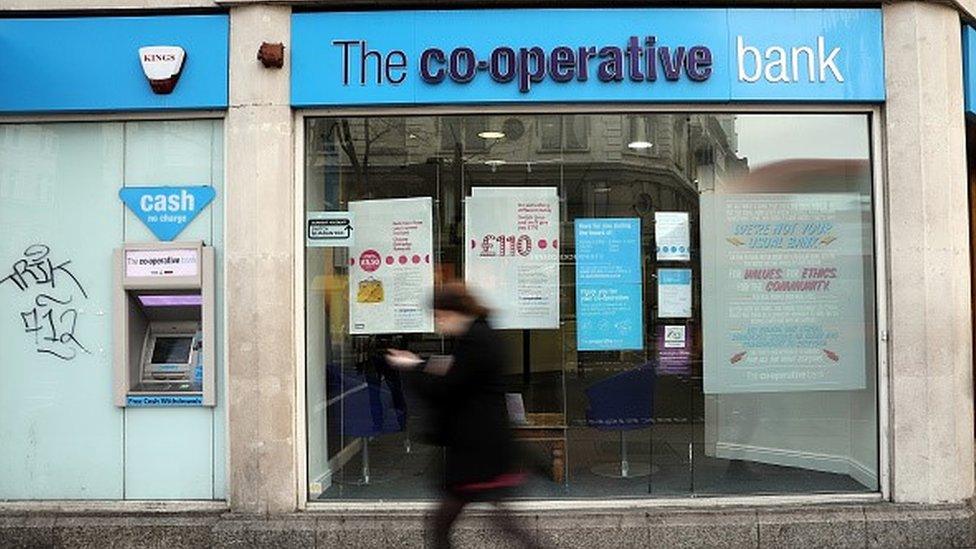Hopes fade for Co-op Bank turnaround plan
- Published

The Bank of England has placed the Co-op Bank under "intensive supervision" as survival options for the ethically-based lender dwindle.
The BBC understands contingency plans to ensure the "orderly failure" of the 150 year old bank are well advanced.
Co-op Bank customers will be protected whatever happens, but professional investors took a beating on Wednesday.
The bank has been looking for buyers since February and said it was "pleased" with the interest shown.
Its statement added that the sales process was "well-ordered" and it was "engaging with potential bidders as planned".
Losses
Some creditors saw the value of their bonds tumble to just 25% of their face value of the amount they lent the bank.
That is down from 50% just a week ago and bond traders told the BBC that indicates a 1-in-4 chance of the bank's survival in its current form.
The loss-making bank put itself up for sale last month, after saying it was struggling to earn enough money to mend its broken finances.
It recently reported an annual loss of £477m, bringing its cumulative losses over the last five years to more than £2.7bn.
The board is still insisting that its preferred solution is a sale of the entire bank, but the short list of buyers is getting shorter.
Potential bidders
In an interview with a Spanish newspaper yesterday, the chairman of Sabadell, which bought the TSB from Lloyds, said acquiring Co-op Bank "did not fit our strategy at the moment".
The TSB had been widely seen as a potential buyer for the troubled bank and while sources close to the company had said that a transaction was "possible", yesterday's comments confirmed it was not a high priority.
There are other potential bidders, including Clydesdale and Virgin Money, but financial markets are rapidly reducing the odds on a sale of the bank as a whole.
If a sale doesn't happen, lenders to the bank - which include several American hedge funds - would be asked to write off the money they are owed in return for shares in the company. These shares would be hard to value given the parlous state of the company's finances after massive recent losses and the bank's self-confessed inability to earn itself out of trouble.
That trouble became apparent in 2013 when background checks into Co-op's own ability to buy what is now known as the TSB, revealed a black hole in its finances of £1.5 billion. It narrowly escaped bankruptcy back then by raising money from specialist investors which reduced the wider Cooperative Group share to just 20%.
Co-op Bank has been limping along since then with less shock-absorbing capital than the regulator thinks is appropriate for a four million customer bank and the Bank of England stands ready if other options fail. Ultimately, that could mean the dismantling of a 160 year old financial institution and the biggest financial rescue since 2009.
To be clear, we are not at that point yet.
Deposit guarantee
Potential buyers have until 4 April to submit their bids for the company and there are the options already discussed to raise money after that date. Financial markets are betting heavily against Co-op Bank's survival in its current form, BUT the fact that its bonds are worth anything at all means some investors still think Bank of England intervention is avoidable.
Co-op customers have very little to fear as current accounts, personal loans and mortgages would be taken on by another bank if necessary and deposits up to £85,000 are guaranteed by the Financial Services Compensation Scheme.
Customers of the ethically focused Co-op bank have been very loyal during a period which has seen big losses, branch closures and a drug scandal involving its former non-executive chairman, Paul Flowers dent the financial and ethical integrity of Co-op bank.
It may yet live to fight on, but the Bank of England is braced for its failure.